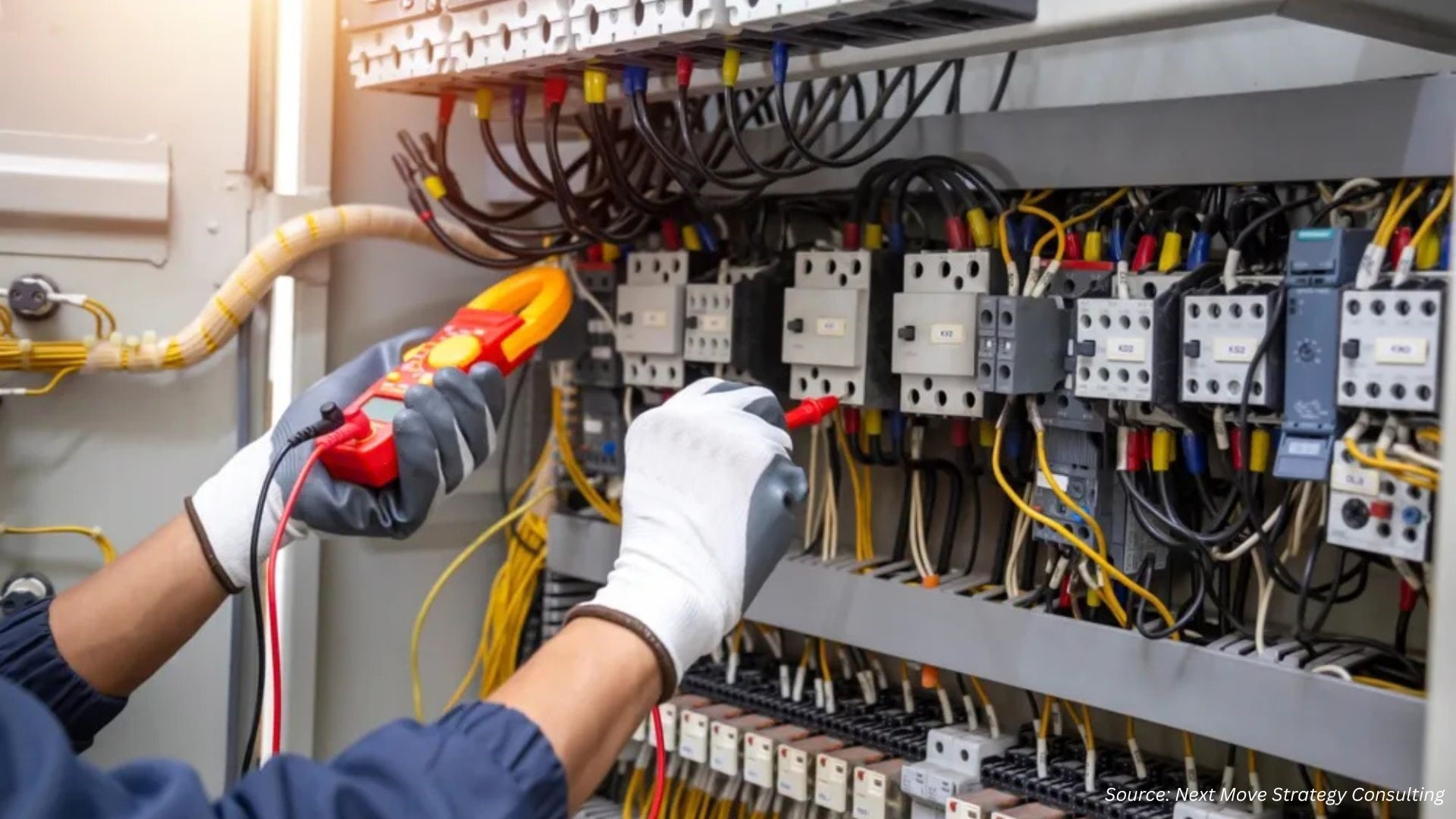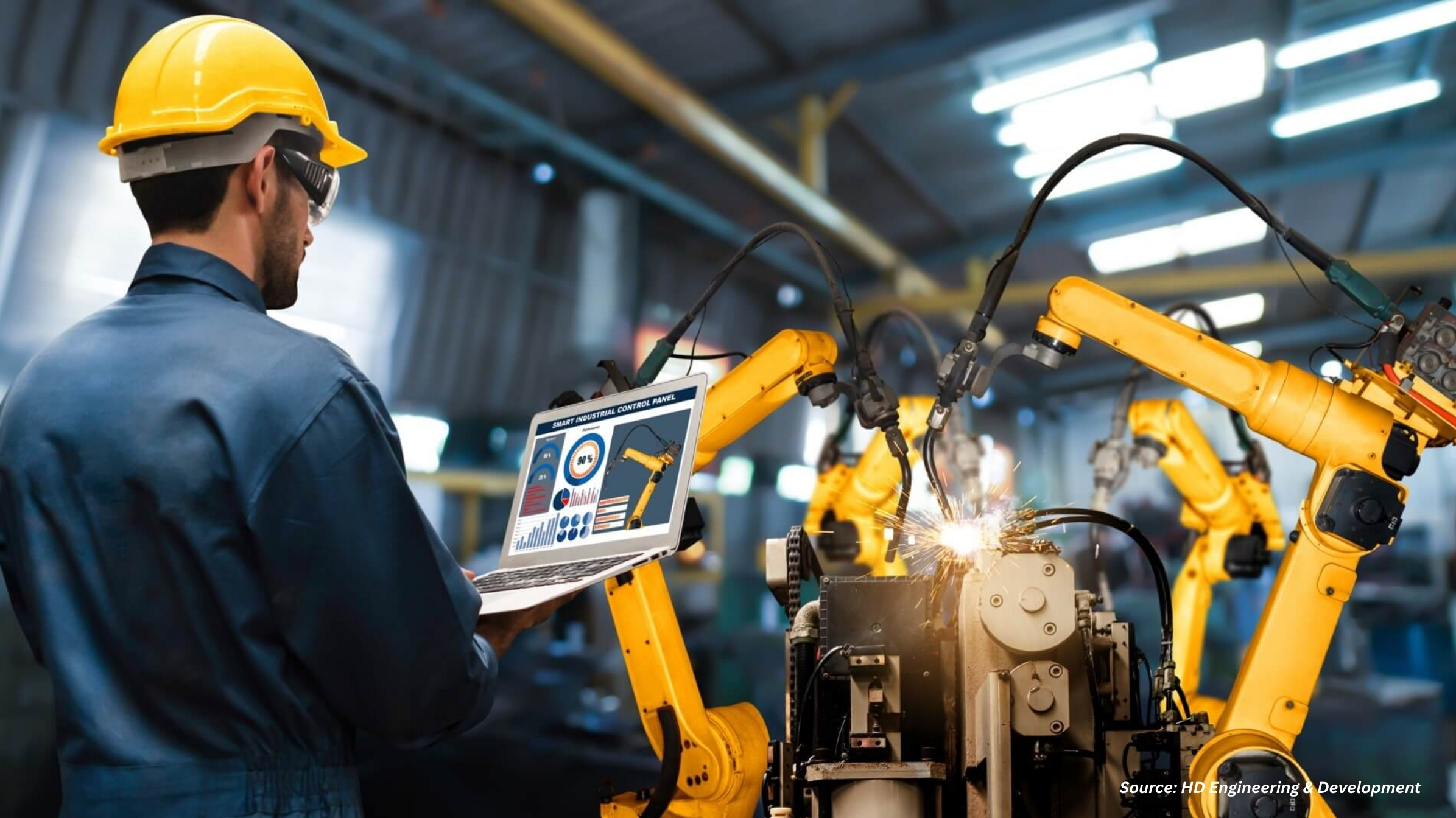
India Distributed Control System Market (DCS) by Component (Hardware, Software, and Services), by Architecture (Centralized Controller Systems, Hybrid / Distributed Hybrid Systems, and Fully Redundant High-Availability Systems), by Application (Batch, and Continuous Process), by Project Type (New Construction, Replacement, and Upgrade/Expansion), by Plant Size (Small, Medium, and Large), and by End User (Oil & Gas, and others) - Opportunity Analysis and Industry Forecast 2024–2030
Industry: Semiconductor & Electronics | Publish Date: 08-Sep-2025 | No of Pages: 102 | No. of Tables: 133 | No. of Figures: 78 | Format: PDF | Report Code : SE944
Market Definition
India Distributed Control System (DCS) Market was valued at USD 1.12 billion in 2023, and is predicted to reach USD 2.09 billion by 2030, with a CAGR of 9.1% from 2024 to 2030. A Distributed Control System (DCS) is a computer-based control system widely employed to oversee and automate industrial processes. It comprises a network of controllers distributed throughout industrial facilities, facilitating communication and coordination in the automation of various processes. DCS systems find applications across diverse industries, including but not limited to the chemical, petrochemical, pharmaceutical, food and beverage, and power generation sectors.
These systems are particularly valuable in large-scale industrial processes demanding a high level of automation and control, such as those in oil refineries, chemical plants, and power stations. They serve to regulate and oversee a range of operations, including drilling, refining, blending, manufacturing, filtration, and disinfection, ensuring processes run with precision, efficiency, and safety.
The utilization of DCS systems offers numerous advantages, including enhanced process control, heightened efficiency, and improved safety, along with reduced downtime. DCS achieves this by distributing control functions across multiple controllers, providing redundancy and fault tolerance. This means that even in the event of a controller failure, industrial processes can continue to operate without disruptions.
DCS systems have evolved into indispensable components of modern industrial automation setups, substantially enhancing the reliability and efficiency of industrial processes. Furthermore, they contribute to safety by enabling real-time control and process monitoring. They are capable of detecting potential safety hazards and promptly alerting operators to take corrective measures. DCS systems are also instrumental in predictive maintenance, facilitating proactive maintenance practices that minimize downtime. They collect and analyse data from sensors, offering valuable insights for continuous process improvement.
Rapid Digital Transformation in Process Industries Through Industry 4.0
India’s process-intensive industries are undergoing accelerated digital transformation, driven by Industry 4.0 adoption. The integration of Industrial Internet of Things (IIoT), advanced process control, and AI-powered analytics is enabling real-time decision-making, predictive maintenance, and greater process transparency. Distributed Control Systems (DCS) serve as the central nervous system of these smart factories, providing unified process monitoring and precision control across geographically dispersed assets.
In India, sectors such as oil & gas refining, specialty chemicals, pharmaceuticals, and metals & mining are heavily investing in DCS upgrades to replace aging systems, meet zero-downtime production demands, and comply with evolving environmental and safety regulations. Government-backed programs supporting industrial modernization and technology-led competitiveness are further catalyzing DCS deployments.
Rising Renewable Energy Integration and Grid Stability Requirements
India’s accelerating energy transition, marked by ambitious renewable capacity targets exceeding 500 GW by 2030, is driving demand for intelligent control systems that can handle the variability of solar, wind, and hybrid power plants. Modern DCS platforms provide real-time grid balancing, seamless renewable–storage integration, and advanced fault recovery, ensuring operational stability in an increasingly decentralized energy ecosystem.
Additionally, conventional power plants—including coal, gas, and nuclear—are undergoing modernization to meet emission norms and safety standards. DCS systems in these plants support precise load management, fuel optimization, and integration of emission control technologies, ensuring compliance while improving operational efficiency.
Escalating Cybersecurity Vulnerabilities in Industrial Automation
As Indian industries adopt connected automation systems, cybersecurity risks within operational technology (OT) networks are intensifying. Modern DCS platforms with cloud connectivity, remote access, and IIoT device integration are increasingly targeted by sophisticated cyberattacks, especially in critical infrastructure sectors such as energy, water treatment, and petrochemicals.
While awareness is growing, the presence of legacy systems, limited cybersecurity budgets among small and mid-tier players, and a shortage of skilled OT security professionals hinder the pace of secure DCS adoption. This risk is amplified by India’s rapid digitalization, which often outpaces the implementation of robust cyber defense measures in industrial settings.
Expanding Demand For Scalable And Interoperable Dcs Solutions In Emerging Industries
The increasing adoption of modular and interoperable DCS platforms is opening new growth avenues in India, particularly for mid-sized manufacturing units and emerging sectors like electric vehicle battery production, green hydrogen, and advanced materials. These next-generation systems allow phased implementation, integration with PLCs and edge computing devices, and easy connectivity to cloud-based analytics without overhauling the entire automation infrastructure.
This modularity enables businesses to optimize capital expenditure, minimize production disruptions during upgrades, and rapidly adapt to market or regulatory changes. Furthermore, the growing emphasis on sustainability, energy efficiency, and ESG compliance in India is prompting companies to adopt intelligent DCS architectures capable of delivering both operational efficiency and environmental performance improvements.
Competitive Landscape
The India distributed control system (DCS) industry includes several market players such as ABB Ltd, Honeywell International Inc, Emerson Electric Co, Siemens AG, Schneider Electric SE, Yokogawa Electric Corporation, Rockwell Automation, Inc, GE Vernova, Valmet Oyj, Mitsubishi Power (Mitsubishi Heavy Industries group), Bharat Heavy Electricals Limited (BHEL), Azbil Corporation, ANDRITZ AG, Ingeteam Power Technology, Hitachi, Ltd.
India Distributed Control System (DCS) Market Key Segments
By Component
-
Hardware
-
Controller
-
I/O
-
Workstation
-
Networking Hardware
-
-
Software
-
Service
-
Integration and Implementation
-
Managed Services
-
Support and Consultation
-
By Architecture
-
Centralized Controller Systems
-
Hybrid / Distributed Hybrid Systems
-
Fully Redundant High-Availability Systems
By Application
-
Batch
-
Continuous Process
By Project Type
-
New Construction
-
Replacement
-
Upgrade/Expansion
By Plant Size (Controller I/O)
-
Small (Greater than 5000 I/O)
-
Medium (5000 to 15000 I/O)
-
Large (Less than 15000 I/O)
By End User
-
Oil & Gas
-
Upstream
-
Midstream
-
Downstream and Refineries
-
-
Chemicals & Refining
-
Energy & Power
-
Thermal Power Plants
-
Renewable and Battery Storage Plants
-
Nuclear Power Plants
-
-
Pulp & Paper
-
Metals & Mining
-
Pharmaceutical & Biotech
-
Food & Beverages
-
Cement & Glass
-
Water & Wastewater
-
Others
Key Players
-
ABB Ltd.
-
Honeywell International Inc.
-
Emerson Electric Co.
-
Siemens AG
-
Schneider Electric SE
-
Yokogawa Electric Corporation
-
Rockwell Automation, Inc.
-
GE Vernova
-
Valmet Oyj
-
Mitsubishi Power (Mitsubishi Heavy Industries group)
-
Bharat Heavy Electricals Limited (BHEL)
-
Azbil Corporation
-
ANDRITZ AG
-
Ingeteam Power Technology
-
Hitachi, Ltd.
REPORT SCOPE AND SEGMENTATION:
|
Parameters |
Details |
|
Market Size in 2023 |
USD 1.12 Billion |
|
Revenue Forecast in 2030 |
USD 2.09 Billion |
|
Growth Rate |
CAGR of 9.1% from 2024 to 2030 |
|
Analysis Period |
2023–2030 |
|
Base Year Considered |
2023 |
|
Forecast Period |
2024–2030 |
|
Market Size Estimation |
Billion (USD) |
|
Growth Factors |
|
|
Companies Profiled |
15 |
|
Market Share |
Available for 10 companies |
|
Customization Scope |
Free customization (equivalent up to 80 working hours of analysts) after purchase. Addition or alteration to country, regional, and segment scope. |
|
Pricing and Purchase Options |
Avail customized purchase options to meet your exact research needs. |

















 Speak to Our Analyst
Speak to Our Analyst

























